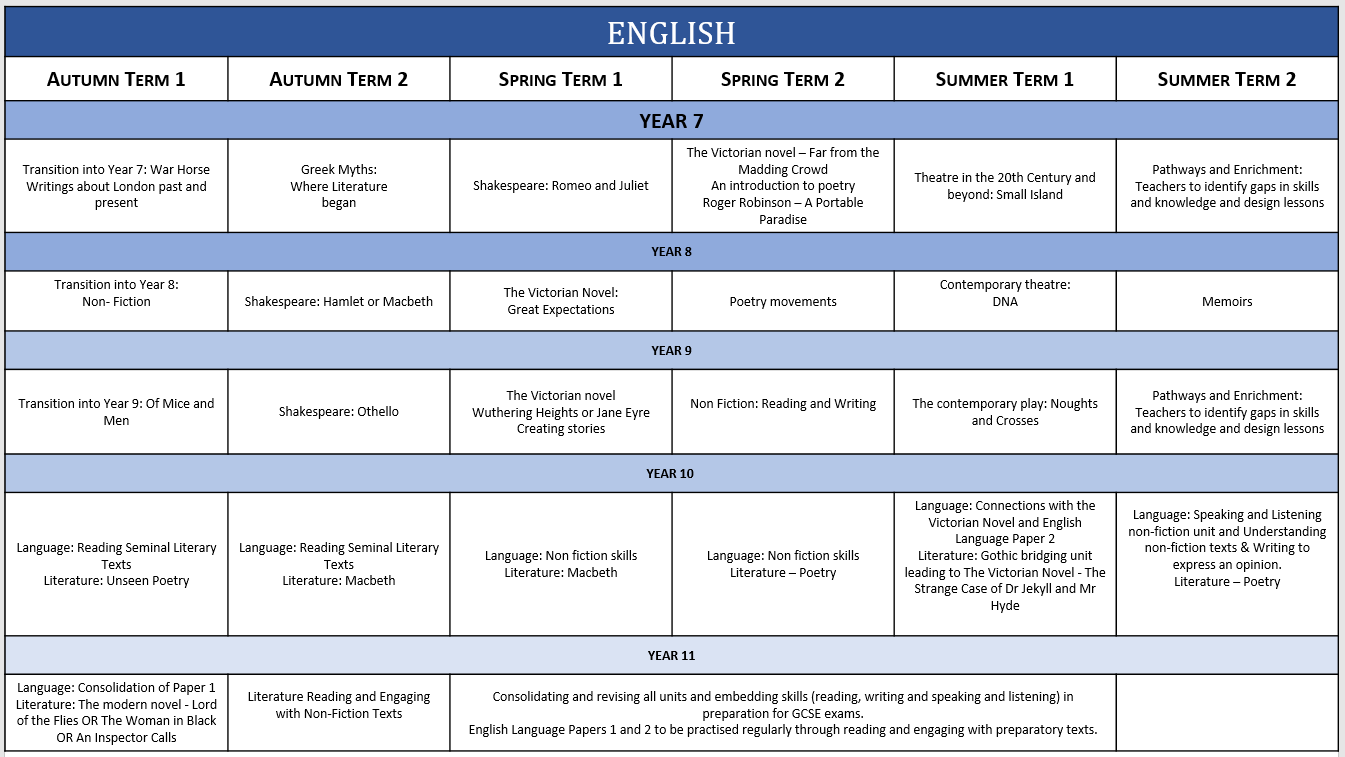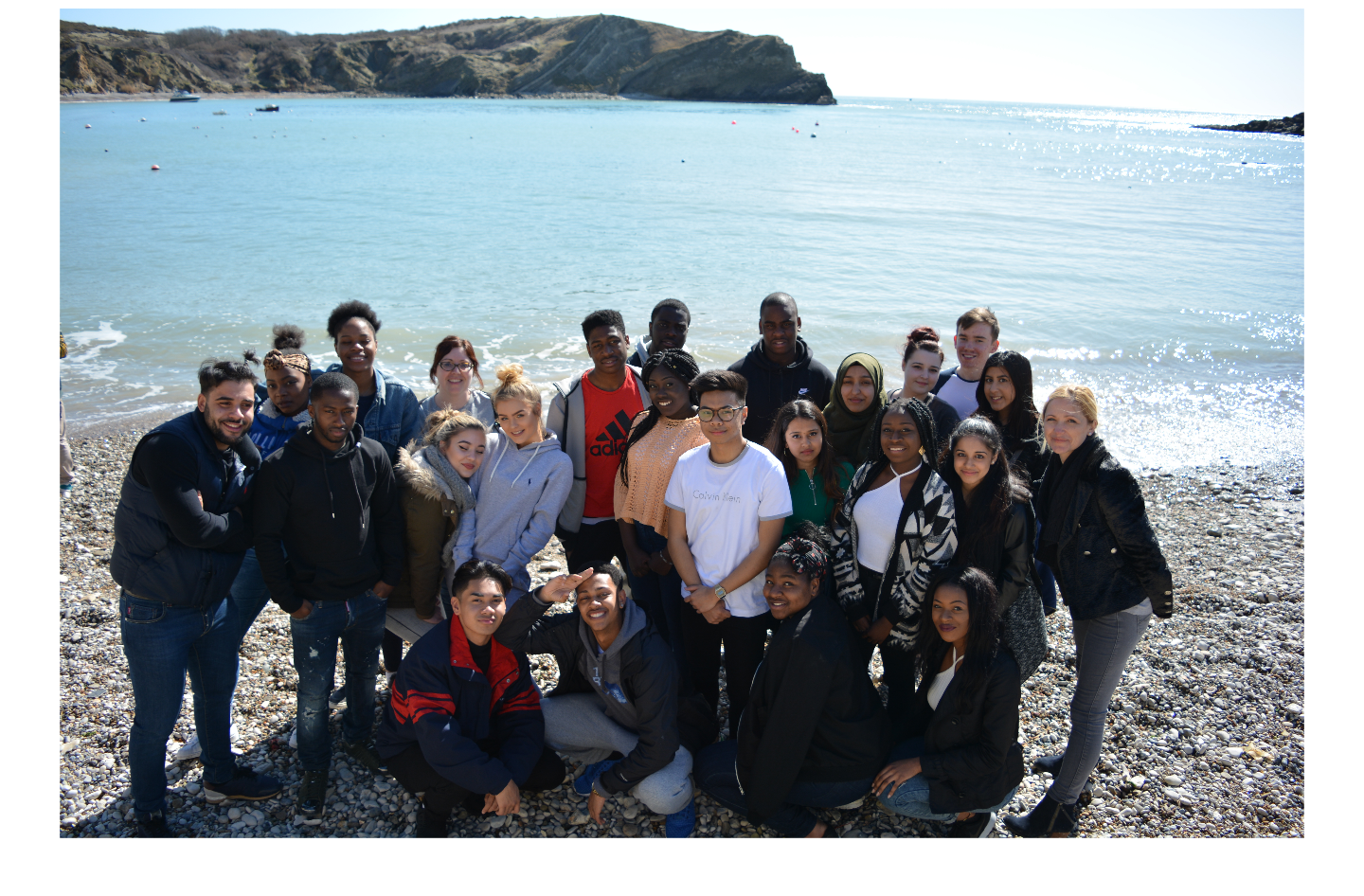English
The English Department (English, Film and Media Studies)
At the very forefront of the English curriculum is the intention to ensure that students’ literacy (both written and verbal) is of the highest standard so that they are able to thrive and flourish within and beyond the educational context. Students regularly encounter new, challenging and stretching vocabulary which is imbedded into their lexicon. Triangulated with Writing and Speaking skills we aim to ensure that students read widely, both independently and as part of their English diet. Also, we aim to ensure that students read a variety of texts both fiction and non-fiction from a variety of eras, that they can do so for enjoyment, competently and with increasing confidence, that they can make connections within and across texts they have encountered and that they build up the repertoire of reading skills reading for meaning, inference, synthesis, judicious selection of ideas from texts, perceptive understanding of what writers say and imply that are vital, transferable tools. The English curriculum has been designed around the opportunity for cultural capital enhancement, harnessing the need for students to explore a literary trajectory that helps them to understand the idea that literature is a form of social commentary and enhances our understanding of key signposts (historical, political, cultural movements) during a given time period. Additionally, the teaching of non-fiction texts and topics allows English to cross into notable areas of PSHE enabling students to cross-cultivate their skills.
A breadth of writers in English, both male and female, from across the globe and throughout history are a part of the English diet varying from Chaucer to Grace Nichols, from Dickens to Imitiaz Dharker, from Benjamin Zephaniah to Emily Bronte. In addition to this, students learn about universal, timeless themes through English fiction and non-fiction texts of writers varying from Shakespeare’s depiction of conflict, gang warfare and love (Romeo and Juliet), race and oppression (Othello), existential angst (Hamlet), moral conduct and core British values (Macbeth) to ideas about isolation felt when starting a new school (Adrian Mitchell), to women’s struggles to be represented on an equal footing with men (Maya Angelou) to teenage self-discovery (Salinger / Plath) and so on….
English through the Key Stages
We are a dynamic and creative department who are student-centred. Student engagement in learning is seminal: we are restless in adapting and updating units of work from KS3 – KS5 to ensure that they are relevant and remain engaging to our evolving cohorts of students. Our broader intent is to embed excellent literacy in students so that they are able to flourish within their educational life and far beyond this, and working with other departments in the school to ensure this is consistent, is high on our agenda.
As a department, we work collaboratively to keep our year plans fresh and to harness the creativity of our cohorts. We have a progressive approach to learning and view the curriculum as a gradual building, developing and consolidating of skills from age 11-18. We continue to overhaul and update units of work in line with the new Curriculum requirements and to tap into topical areas, ensuring that student engagement is at the forefront of learning.
Our commitment to reading and promoting high quality literature as a tool for enhancing Cultural Capital is at the forefront of our departmental ethos. Each year, we lead the school’s now famed World Book Day celebrations!
Key Stage 3 Curriculum
We provide a rich and varied Key Stage 3 curriculum with students studying a range of classic, canonical texts and more contemporary works. These include a yearly Shakespeare text, Great Expectations, Animal Farm, Cider with Rosie, War Horse, The Boy in the Striped Pyjamas and units such as a Sherlock Holmes media unit and a variety of seminal world literature and performance poetry. We ensure that our curriculum from KS3 to KS4 in progressive and, at the end of Year 9 students are assessed on their Reading and Writing Skills using GCSE papers in order to consolidate skills learned and prepare them for the rigours that lie ahead.
Key Stage 4 Curriculum
We currently study the AQA specification at GCSE. There is a huge onus, in the ever changing landscape of English, on all students taking English Language and Literature at the end of Key Stage 4. We believe that studying literature can enthuse, engage and impassion students and strive to ensure that we develop our students into keen readers who read for pleasure and enrichment as this is the key to creating students, and ultimately adults, with excellent operational literacy! At Key Stage 4, we have recently developed new units of study including fiction reading and writing units and Literature units on texts such as The Woman in Black, The Romantic poets, Dr Jekyll and Mr Hyde and Blood Brothers. We are relentless in our commitment to ensuring that students study a variety of texts throughout their years here.
In our first year of teaching the new 9-1 specifications, we were incredibly proud that 17 students attained level 9s at GCSE. This equates to 15% of the cohort compared with 3% nationally. This success has been built on year on year and we are currently recognised as an Outstanding department at ALPs level 2.
Key Stage 5 Curriculum
We are one of the most popular A-level subject choices with students leaving us and going on to study Law, Journalism, English or Philosophy. The Key Stage 5 Curriculum is balanced and engaging with room for creativity as well as academic rigour. Students study texts ranging from canonical classics such as Hamlet and Wuthering Heights to a Streetcar Named Desire and A Thousand Splendid Suns. Our A-C pass-rate at A-level has been between 90% and 100% for the past 3 academic years and our A-B pass-rate at 60% with 5 A*s attained in 2017 and 10 A/A* grades in 2018 representing 50% of the cohort. We have been commended in recent years by inspectors and visitors to the school on the academic atmosphere of our A-level classes with the 2013 Ofsted report and the 2017 external review focusing on the outstanding teaching noted in an A-level English class.
We also offer excellent GCSE resit or first entry opportunity to Sixth form students – tailoring provision to their needs and ensuring the same expectations and academic rigours of KS4 are applied here.
Curriculum Map

Enrichment Opportunities
The wider student experience is central to our departmental ethos. The English department run a range of extra-curricular enrichment opportunities including theatre trips, debating societies and creative writing competitions. We have worked very successfully on Film-making projects with the BFI in recent years, with 2 films winning “Best editing” (Head Boy) and “Best Film” (Macbeth) and we are always looking to cultivate new up-and-coming directors! We run a series of residential trips for Sixth form students including a trip to Bronte country and another to Thomas Hardy’s rural Dorset as well as harnessing an excellent relationship with Keats’ House Museum. We plan to extend this to KS3 and KS4 with planned trips to Stratford Upon Avon for the study of Shakespeare and the Lake District to enable us to explore the landscape of The Romantics and are currently planning a Sixth form trip to Rome to help us to further explore the poet John Keats and his last months spent there.
Y13 Enrichment trip to Dorset (enhancing the study of Hardy’s “Tess of the D’Urbevilles”

For further information please contact us via email - schooladmin@bishopdouglass.barnet.sch.uk





